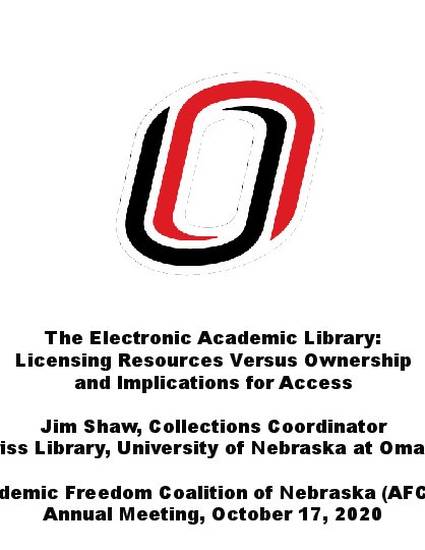
Presentation
The Electronic Academic Library: Licensing Resources Versus Ownership and Implications for Access
Academic Freedom Coalition of Nebraska (AFCON) annual meeting
(2020)
Abstract
College and university libraries commonly spend 75% to 85% of their acquisitions budgets on electronic resources. That is how they provide access to many thousands of electronic books, research journals, historical archives, and other resources. Many may not appreciate, however, that libraries do not actually own electronic resources, but instead purchase licenses which permit use within certain parameters. For example, academic licenses typically permit off-campus use only to current faculty and students. Non-affiliated persons may usually access resources on computers at the library, but that is not guaranteed. Spending so much on electronic resources necessarily implies that when budgets are cut, some of those licenses will not be renewed and access for everyone is lost. Libraries have been able to leverage electronic resources in ways that provide more to their users than ever, but this new era could prove volatile and create further separation between the haves and have-nots.
Keywords
- Academic libraries,
- electronic resources,
- licenses
Disciplines
Publication Date
October 17, 2020
Location
Virtual conference
Citation Information
James T. Shaw. "The Electronic Academic Library: Licensing Resources Versus Ownership and Implications for Access" Academic Freedom Coalition of Nebraska (AFCON) annual meeting (2020) Available at: http://works.bepress.com/jamestshaw/14/
Creative Commons License

This work is licensed under a Creative Commons CC_BY-NC-ND International License.
